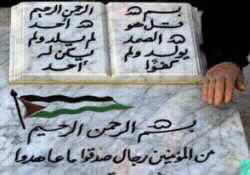Israel canceled plans on Tuesday to relax its tight grip on Palestinian movement in the West Bank and Gaza Strip on the occasion of a Muslim holiday, citing a surge in resistance bombing threats. In new violence, the Israeli occupation army said occupation troops killed an armed Palestinian in Gaza as he entered an off-limits area near an occupation army post on the border between the desert strip and Israel. Israeli authorities announced on Sunday that travel curbs imposed in a bid to dampen a 28-month-old Palestinian uprising against occupation in pursuit of independence would be eased during the four-day Eid al-Adha holiday which began on Tuesday.
But the government rescinded its decision because of what it called a serious increase in intelligence alerts about Palestinian resistance activists trying to sneak across the West Bank's porous border into Israel to carry out resistance bombings.
The continued clampdown prevents Palestinians from visiting relatives and friends in other towns during the Muslim feast.
Israeli Prime Minister Ariel Sharon and Ahmed Korei, a top Palestinian official, had met last week to discuss a possible Israeli occupation army pullback from West Bank cities where Palestinian security services undertook to prevent attacks by resistance activists.
At least 1,824 Palestinians and 700 Israelis have been killed in the revolt led by Palestinian resistance groups, which erupted after U.S-brokered talks on Palestinian statehood in territory Israel captured in the 1967 Middle East war.
After a spate of resistance bombings last year, Israeli occupation troops reoccupied most West Bank territory that had enjoyed self-rule since interim peace deals a decade ago. The occupation army also tightened restrictions on movement between towns in Gaza.
"They are insisting to do this against our people," Palestinian President Yasser Arafat (new told reporters in the West Bank city of Ramallah on Tuesday. "But our people are very strong and the mountain can not be shaken by the wind."
But Palestinians cut off from their families were angry.
"This is in breach of all human values," said Kamal Assad, a 35-year-old Ramallah shopowner who had planned to visit his parents in the West Bank city of Jenin for the holiday.
Israel's original plan to ease the closure would also have allowed Palestinians to obtain permits to enter Israel to visit relatives and pray at the al-Aqsa mosque, Islam's third holiest shrine in the walled Old City of Jerusalem.
PALESTINIANS GROUNDED OVER 'WAVE OF THREATS'
An occupation army spokesman attributed the extended closure to "many intelligence reports on the intentions of terrorist organizations to carry out (new) attacks."
Israeli occupation army radio said Defense Minister Shaul Mofaz decided to keep Palestinians grounded after reports resistance activists were planning double resistance attacks -- two bombers in each location.
Salam Jaber, a 42-year-old engineer in Ramallah, questioned Israel's motives. "I don't know how Israel can achieve security by banning family reunions on holidays like these," he said. Sharon's right-wing Likud party was resoundingly returned to power in elections last month based on widespread support for his hard-nosed military responses to Palestinian violence.
But the United States, Israel's guardian ally, wants calm in the Israeli-Palestinian conflict as it accelerates preparations for a possible war to disarm Iraq.
The new high-level Israeli-Palestinian dialogue pursued by Sharon, envisaging a temporary truce, was expected to continue this week despite doubts such a deal can work given vows by resistance activists to keep fighting.
Sharon's first direct contact with Palestinians in a year coincided with his attempts to coax into his next coalition his main rival, the center-left Labour Party, which demands a resumption of peace talks with Palestinians.
Labour has so far ruled out joining a Sharon-led government unless he commits to fresh peace negotiations and withdrawals -- both occupation troops and Jewish settlers -- from some occupied territory.
Sharon has said he wants a "national unity" coalition at a time of possible upheaval in the Middle East over Iraq.
Coalition talks were continuing on Tuesday.
PHOTO CAPTION
A Palestinian woman touches the tomb of her son in the Martyr's cemetery in Gaza City February 11, 2003 during the Eid Al-Adha, The Feast of Sacrifice, the most important feast of the Muslim calendar which concludes the pilgrimage to Mecca. In the first day of celebrations Muslims pay their respects to dead relatives. REUTERS/Radu Sigheti
- Author:
Reuters - Section:
WORLD HEADLINES


 Home
Home Discover Islam
Discover Islam Quran Recitations
Quran Recitations Lectures
Lectures
 Fatwa
Fatwa Articles
Articles Fiqh
Fiqh E-Books
E-Books Boys & Girls
Boys & Girls  Hajj Rulings
Hajj Rulings Hajj Fatwas
Hajj Fatwas














